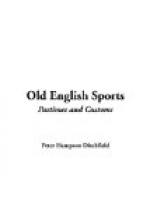taken down. So the merry May songs were hushed
for many a long year, until Charles II. was restored
to his throne, and then the stately pole was reared
once more, and Robin Hood and his merry crew began
their sports again. But times change, and we
change with them: customs pass away, and with
them have long vanished the May-pole and its bright
group of light-hearted rustics. An American writer
who visited this country thus describes his feeling
when he saw an old May-pole still standing at Chester—“I
shall never forget my delight. My fancy adorned
it with wreaths of flowers, and peopled the green bank
with all the dancing revelry of May Day. I value
every custom that tends to infuse poetical feeling
into the common people, and to sweeten and soften
the rudeness of rustic manners without destroying their
simplicity. Indeed, it is to the decline of this
happy simplicity that the decline of this custom may
be traced, and the rural dance on the green, and the
homely May-day pageant, have gradually disappeared
in proportion as the peasantry have become expensive
and artificial in their pleasures, and too knowing
for simple enjoyment. Some attempts, indeed,
have been made by men of both taste and learning to
rally back the popular feeling to their standards of
primitive simplicity; but the time has gone by, the
feeling has become chilled by habits of gain and traffic,
the country apes the manners and amusements of the
town, and little is heard of May Day at present, except
from the lamentations of authors, who sigh after it
from among the brick walls of the city.”
The name of the parish of St. Andrew Undershaft
records the place where the city May-pole, or shaft,
was erected, and Shaft Alley the place where
it lay when it was not required for use.
The proclamation of James I., called the “Book
of Sports,” which was renewed by King Charles
I., throws some light upon the sports in vogue during
his reign. It was enacted “for his good
people’s lawful recreation, after the end of
Divine service, that his good people be not disturbed,
or discouraged, from any lawful recreation, such as
dancing for men and women, archery for men, leaping,
vaulting, or any such harmless recreations; nor from
having May games, Whitsun ales, and morris dances,
and the setting up of May-poles, and other sports
therewith used, so as the same be had in due and convenient
time, without impediment or neglect of Divine service.
And that women shall have leave to carry rushes to
the church for the decorating of it, according to
their old custom. But withal his Majesty doth
hereby account still as prohibited all unlawful games
to be used on Sundays only, as bear and bull-baiting,
interludes, and at all times in the meaner sort of
people by law prohibited, bowling.”
Why his Majesty should have been so very severe on
the game of bowls, which is a very ancient pastime,
and innocent enough, is not at first quite clear;
but it appears that the numerous bowling-alleys in
London were, in the sixteenth century, the resorts
of very bad company, and the nests of gambling and
vice. Hence the severity of King James’
strictures on bowling.




